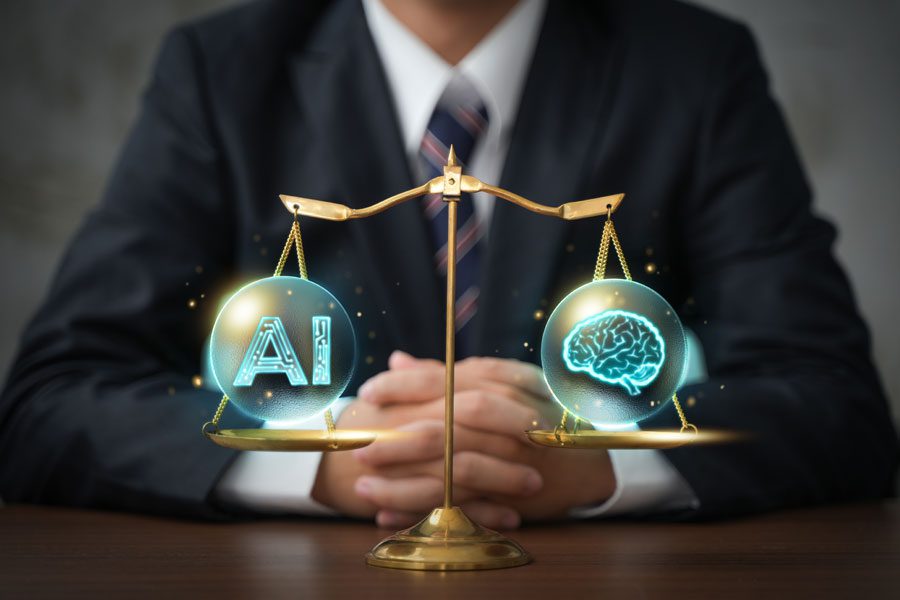Artificial intelligence (AI) is reshaping industries, decision-making processes, and creative fields. Its influence spans healthcare, transportation, communication, and entertainment, introducing unique challenges for existing legal systems.
Traditional laws often fail to address the complexities AI introduces, resulting in the rise of a specialized legal field: AI law. Attorneys in this area must tackle intricate issues, such as regulating machine-generated content, ensuring data privacy, and assigning accountability when AI systems fail.
What Is AI Law?
AI law deals with the legal implications of artificial intelligence. This specialty focuses on intellectual property disputes, privacy regulations, bias in algorithms, and liability concerns. AI’s integration into business and daily life drives the need for legal professionals with deep expertise in both law and technology. Lawyers in AI law often work with companies developing AI tools, governments crafting regulations, and individuals affected by AI-driven decisions.
AI law also bridges gaps between technological advancements and ethical considerations. For example, legal systems must decide how to handle decisions made by autonomous systems, which are neither human nor bound by the same rules. This evolving area provides a unique opportunity for legal professionals to influence the future of technology policy.
Key Challenges in AI Law
Ownership of AI-Generated Content
AI systems like ChatGPT and DALL-E generate creative works, but questions remain about who owns these outputs. Current copyright laws require human authorship for protection. For example, the U.S. Copyright Office recently ruled that purely AI-generated art cannot be copyrighted, leaving creators and developers uncertain about their rights.
Ownership disputes complicate business operations. Developers, users, and organizations may all claim rights to AI-generated works. Attorneys must draft contracts clarifying these rights to prevent litigation. This issue also raises broader questions about whether existing intellectual property laws need reform to accommodate AI.
Data Privacy Issues
AI depends on vast amounts of data to function, much of which is personal and sensitive. For instance, AI-powered healthcare tools analyze patient data to predict diseases, while social media platforms use algorithms to infer user preferences. These applications expose gaps in current privacy laws, which were designed without AI’s capabilities in mind.
Lawyers specializing in AI law must address compliance with regulations like GDPR and CCPA while considering AI-specific risks. For example, an AI tool might infer health risks from social media activity, bypassing traditional privacy safeguards. Attorneys help organizations balance innovation with consumer trust by drafting policies that align with legal requirements and ethical standards.
Algorithmic Bias and Accountability
Bias in AI algorithms presents a serious legal and ethical challenge. Historical data used to train AI often reflects societal inequalities, which AI systems can perpetuate. For example, hiring algorithms may favor male candidates over females, while predictive policing tools disproportionately target minority communities.
Accountability for biased outcomes is unclear. Should the blame fall on developers, organizations deploying the AI, or those who provided the data? Attorneys working in this field advocate for greater transparency in AI decision-making processes. They also push for policies requiring regular audits of algorithms to identify and mitigate bias.
Liability for AI Failures
As AI systems gain autonomy, determining liability becomes increasingly complex. When a self-driving car causes an accident, who is responsible—the manufacturer, the software developer, or the owner? Similar dilemmas arise in healthcare, where AI tools assist in diagnosis and treatment but may provide harmful advice.
Current liability frameworks are not designed for these scenarios. Lawyers specializing in AI law must navigate these gaps, helping establish clear rules for assigning responsibility. They also work with insurers to develop policies that account for AI-related risks.
“This is an emerging practice area in law. If you are an attorney and do not keep up with these trends, you will be left behind,” says Shari Davidson, President of On Balance Search Consultants.
Why AI Law Requires Specialization
AI law requires a unique blend of legal expertise, technological knowledge, and ethical insight. Traditional legal training does not fully prepare attorneys to address AI’s complexities, making specialization essential. Lawyers must understand how AI systems work, interpret evolving regulations, and address ethical implications.
Education for AI Lawyers
Leading universities now offer courses focusing on AI and its legal challenges. Programs often cover topics like intellectual property, data privacy, and algorithmic accountability. For example, the University of California, Berkeley, provides specialized training to equip legal professionals with the skills needed in this emerging field.
Continuing education is also critical. AI evolves rapidly, and attorneys must stay updated on technological advancements and regulatory changes. Seminars, certifications, and workshops help legal professionals remain effective in this dynamic area.
Ethics in AI
Ethics play a central role in AI law. Beyond ensuring compliance, lawyers must advise clients on responsible AI use. This includes promoting fairness, preventing harm, and aligning technology with societal values. For instance, attorneys may recommend policies to increase transparency in decision-making algorithms, fostering trust between companies and users.
Ethical considerations also influence regulatory frameworks. Governments and organizations are increasingly prioritizing ethical AI practices, making expertise in this area crucial for legal professionals.
Opportunities for Lawyers in AI Law
Advising Companies
Businesses adopting AI face complex legal and ethical challenges. From data privacy compliance to intellectual property disputes, companies need guidance to navigate these issues. Lawyers specializing in AI law help organizations develop governance frameworks, draft contracts, and manage risks.
Startups and tech companies often seek legal advice during the development of AI tools. Attorneys play a key role in ensuring that these technologies comply with regulations while maintaining ethical standards. This advisory role is essential for fostering innovation in a responsible manner.
Resolving Legal Disputes
Disputes involving AI are becoming more common. These range from copyright claims over AI-generated content to liability cases involving autonomous vehicles. Lawyers with expertise in AI law handle these cases, often setting new legal precedents. For example, they may argue whether a user’s input into an AI system constitutes co-authorship, shaping how courts interpret intellectual property laws.
Shaping Policy
AI law is still in its infancy, and legal frameworks are far from complete. Lawyers have the opportunity to influence how these regulations are written. By participating in policy discussions, they help ensure that AI technologies are governed in a way that balances innovation with accountability.
Policy work also includes advocating for greater transparency and fairness in AI systems. Legal professionals contribute to creating guidelines that protect individual rights while fostering technological progress.
The Future of AI Law
AI law is a rapidly growing field with immense potential. It challenges lawyers to adapt traditional legal principles to a technology-driven world. Attorneys must combine legal expertise with technical literacy and ethical awareness to address AI’s unique challenges.
The demand for AI law specialists will continue to grow as AI becomes more integrated into society. Legal professionals in this field have the chance to shape how AI is developed, regulated, and used. By addressing key issues like data privacy, bias, and liability, they ensure that AI serves society responsibly.
AI law represents a transformative opportunity for the legal profession. Attorneys who embrace this field can lead in creating policies and frameworks that protect human rights while enabling technological progress. The journey requires dedication and collaboration but offers the chance to make a lasting impact on society.
About On Balance Search Consultants
On Balance offers great insight and industry intelligence. Shari Davidson, president of On Balance Search Consultants, advises law firms on how to take a firm to the next level and helps rising talent make the transition to the right law firm.
Contact us today. Call 516.731.3400 or email shari@onbalancesearch.com
Please note that the content of this blog does not constitute legal advice and is only intended for the educational purpose of the reader. Please consult your legal counsel for specifics regarding your specific circumstances and the laws in your states pertaining to social media and any legal restrictions regarding the law.





